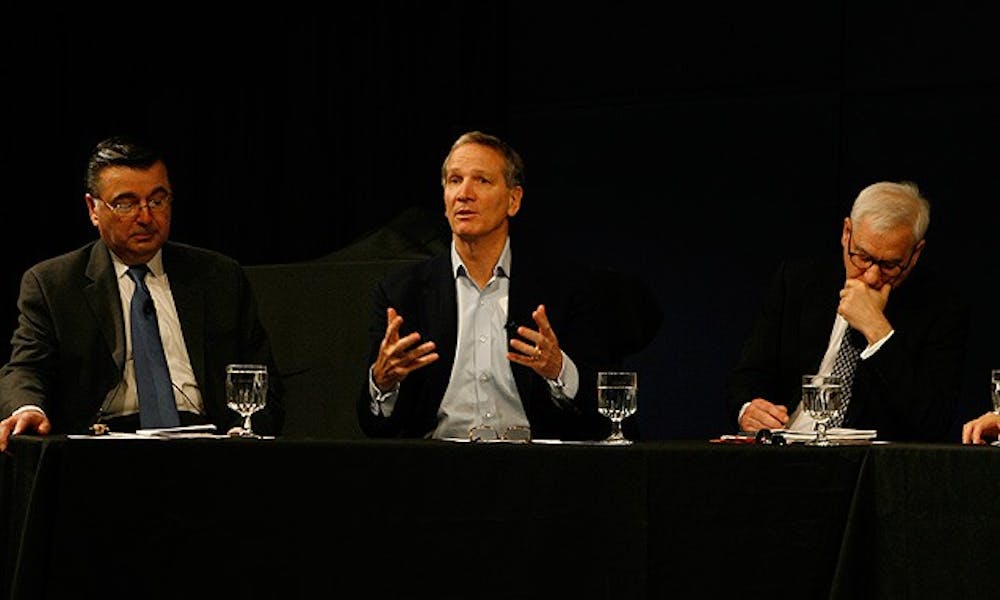A group of financial industry leaders gathered at the Fuqua School of Business Saturday to dissect the global economic crisis.
Following an introduction by Douglas Breeden, former dean of Fuqua and William W. Priest professor of finance, the panel of seven experts discussed the financial health of the American and global economies. Among the panelists were Board of Trustees members Alan Schwartz, Trinity ’72, David Rubenstein, Trinity ’70 and Bruce Karsh, Trinity ’77, each of whom has been at the helm of a major financial institution. Anthony Santomero, a senior adviser from McKinsey & Company, moderated the discussion.
The event attracted a crowd of more than 400, which gathered in the Geneen Auditorium at Fuqua Saturday afternoon. The discussion, “The Future of Lending, Credit and Leverage,” was the second in the school’s four-part series, titled “The Future of Capitalism.”
Panel members discussed the causes and implications of the financial crisis.
Some members of the panel took issue with using the growth rate of a country’s gross domestic product as a means of judging whether an economy is still in a recession. Unemployment statistics, one member of the panel noted, are perhaps a better indicator of the actual health of an economy.
Rubenstein said the U.S. is, by some measures, out of the recession but its debt is still very problematic. By the The Carlyle Group co-founder’s estimates, United States has $14 trillion in debt, with $5 trillion of debt from Fannie Mae and Freddie Mac.
“A trillion dollars, many people don’t realize how big that is,” Rubenstein said. “If the day that Jesus Christ was born, a million dollars was put into a bank account and another million was put in the bank every day for the next 2010 years, you still wouldn’t have a trillion. Well, we have $57 trillion of this stuff that we have to pay off.”
In the discussion of the aftermath of the crisis, Brian Cartwright, former general counsel of the Securities and Exchange Commission, stressed that it is important that any regulations or changes to the financial system address the broad factors that contributed to the crisis. He said he fears regulators will focus too much on the surface issues and not address the underlying causes, which took decades to manifest.
“To make a perhaps not terribly good metaphor, you’ve got a steep hillside up the mountains and the snow is falling down,” Cartwright said. “And it falls down on it year after year after year after year, and it gets bigger and bigger and bigger and steeper and steeper and steeper. And then, suddenly, there is a loud noise and there’s an avalanche. And after that, everyone focuses on the loud noise and says, ‘No loud noises around here and we’ll be okay.’”
The macroeconomic nature of the global recession and the intertwined nature of the world’s markets will have important implications for the United States during this century, panelists said.
Rubenstein said that although the members of the panel grew up in a time during which the U.S. was the world’s dominant economy, this will not be the case for the business students in the room or their children. By his estimate, by 2030 to 2035, China will likely be the largest economy in the world and India will be number two.
In response to Rubenstein’s comments, Cartwright noted that the United States has had the largest GDP in the world since the 1880s. The U.S. currently accounts for between one-fourth and one-fifth of global output, but that will not be the case for long, Cartwright added.
“The point is that the rest of the world matters,” Cartwright said. “Because we’ve been so big for so long, and we’re such a big country and most of us all speak English, I think we have a somewhat inward-looking perspective.”
Moving beyond the crisis will require a good understanding of its underlying causes. Cartwright pointed out that Congress has created the Financial Crisis Inquiry Commission and is expecting a report by Dec. 15 that analyzes the problems that led to the recession. The FCIC was given 22 specific areas to investigate and looks to provide a fuller understanding of the economic contraction.
Get The Chronicle straight to your inbox
Signup for our weekly newsletter. Cancel at any time.

